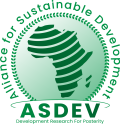By Bessy T Efed
Mabanda Kombo is a small, isolated island community surrounded by River Wouri and the Atlantic Ocean in Cameroon. As a gender-dynamic community, women and men participate in all fishing activities within the fisheries system. These gender dynamics are based on social norms and the historical foundation of the community, which permitted men and women to fish together. Women of Mabanda Kombo are involved in fish harvesting as a source of livelihood, just like men, an activity considered to be done only by men in many other fishing communities in Cameroon. There are even more women fishers than men, dominating in harvesting and post-harvest fishing activities. Typically, the women go fishing very early in the morning and depending on the catch, they either return by midday or late in the evening. Some even spend more days at sea trying to get more fish, especially as fish catch volumes continue to reduce.
Active participation in fishing is seasonal. In periods of plenty, catch mostly during the dry season (November to March), the men and women make several fishing trips in a day. When fishers return from the sea, their children help them remove the fish from the net and get the nets ready for the next trip. Children engage in fishing activities at a very young age, with their parents teaching them and passing down the fishing traditions. A mother said, “as we are aging, we concentrate more on fish processing while their children are the ones who go for fish harvesting, making everything easy for the family.” Fish processing is done predominantly by women with the help of their children. They cut down mangroves and use them as firewood to smoke their fresh fish and as an energy source to cook their food. This process has led to the degradation and pressure on the mangrove ecosystem. Fresh and smoked fish are sold to other women fish traders in Douala, who sell them in the local markets. However, despite the contribution of this community to the food security of the people in Cameroon, the community has several challenges. There is no portable water source or electricity.


